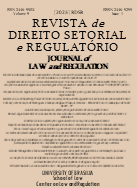Smart cities and the sanitation
An evaluation of regulatory aspects and contribution to an analytical methodology of the smart cities
Palabras clave:
Technology. Life quality. Public Services. Urban area. Smart city.Resumen
[Purpose] With over half the population living in the urban areas, cities face rising challenges. Hence, the concept of smart cities seeks, with the aid of technology, to improve life quality and increase the provision of urban services, especially the basic sanitation services. Although these ideas can correlate, the lack of analytical methodologies hinders the development of studies in the field.
[Methodology/approach/design] It analizes the regulatory aspects of structuring the basic sanitation service of municipalities classified as smart cities, with the intent to contribute to the creation of this methodology.
[Findings] The data evaluated shows that the smart cities present similar regulatory characteristics, bringing relevant information to the improvement of the studies in the area, allowing to understand later whether the structuring of the basic sanitation provided by these cities contributes to the efficiency of these services.
Descargas
Citas
BRASIL. ANA – Agência Nacional de Águas. Atlas Esgotos. 2021. Disponível em: http://atlasesgotos.ana.gov.br/
BRASIL. IBGE – Instituto Brasileiro de Geografia e Estatística. Mapa das cidades. 2010. Disponível em: https://cidades.ibge.gov.br.
CORREIA, Laís Ariane Martins Barbosa; BANDEIRA, Juan Muller de Andrade; GALVÃO, Maria Luiza de Medeiros; MORAIS, Ione Rodrigues Diniz. Saneamento e sustentabilidade urbana: a cidade pequena no contexto do semiárido nordestino. Sociedade e Ambiente: diálogos, reflexões e percepções. Campina Grande: Realize Editora, 2020. p. 396-413 apud SOUZA, Marcelo Lopes de. Mudar a cidade: uma introdução crítica ao planejamento e à gestão urbana. Rio de Janeiro: Bertrand Brasil, 2001. Disponível em: https://editorarealize.com.br/artigo/visualizar/65049.
COSTA, Aldenilson dos Santos Vitorino; EGLER, Tamara Tania Cohen; PUIGDEMASA, Maria Antônia Casellas. Política Urbana de Inovação Tecnológica: Experiências de Cidades Digitais no Brasil. Finisterra: Revista Portuguesa de Geografia. Vol. 54, Nº 110. p. 93-113, 2019. DOI: https://doi.org/10.18055/Finis15347.
KOMNINOS, Nicos. The Architecture of intelligent cities: Integrating human, collective, and artificial intelligence to enhance knowledge and innovation. 2nd IET International Conference of Intelligent Environments. Institution of Engineering and Technology. Athens, 5-6 Jul., p. 13-20, 2006. DOI: https://doi.org/10.1049/cp:20060620.
LAZZARETTI, Kellen, SEHNEM, Simone; BENCKE, Fernando Fantoni. MACHADO, Hilka Pelizza Vier. Cidades inteligentes: insights e contribuições das pesquisas brasileiras. Revista Brasileira de Gestão Urbana. Vol.. 11, e20190118. p. 01-16, 2019. DOI: https://doi.org/10.1590/2175-3369.011.e20190118.
LEMOS, André. Cidades inteligentes: de que forma as novas tecnologias – como a computação em nuvem, o big data e a internet das coisas – podem melhorar a condição de vida nos espaços urbanos? Revista GV-Executivo. Vol. 12, Nº 2, Jul./Dez., p. 46-49, 2013. Disponível em: https://bibliotecadigital.fgv.br/ojs/index.php/gvexecutivo/article/view/20720/19454.
MARQUES NETO, Floriano de Azevedo. A regulação no setor de saneamento. In CORDEIRO, Berenice de Souza (Coord.). Lei Nacional de Saneamento Básico: Perspectivas para as políticas e a gestão de serviços públicos. Livro I. Brasília: Editora Nacional. p. 165-191, 2009.
MOLINA-GIMENEZ, Andres. Water Governance in the Smart City. WIT Transactions on The Built Environment. Vol. 179, p. 13-22. 2018. DOI: https://doi.org/10.2495/UG180021.
MORAES, Luiz Roberto Santos. Política e plano de saneamento básico: aportes conceituais e metodológicos. In CORDEIRO, Berenice de Souza (Coord.). Lei Nacional de Saneamento Básico: Perspectivas para as políticas e a gestão de serviços públicos. Livro I. Brasília: Editora Nacional. p. 33-53, 2009.
MORAES, Patrícia Barros. Propostas e desafios nas cidades digitais. In LEMOS, André. Cibercidade: as cidades na cibercultura. Rio de Janeiro: E-papers. p. 27-42, 2004.
ONU – ORGANIZAÇÃO DAS NAÇÕES UNIDAS. World urbanization prospects: the 2011 revision. Disponível em: https://www.un.org/en/development/desa/publications/world-urbanization-prospects-the-2011-revision.html.
PORTUGAL. INE – Instituto Nacional de Estatística, 2021. Disponível em: https://www.ine.pt/scripts/db_censos_2021.html.
ROSA, Fabricia Silva da; DOS SANTOS, Mirella Cristiane; DOS SANTOS, Heitor Gerson. Cidades sustentáveis: estudo sobre o saneamento básico de maiores municípios catarinenses a partir do Índice de Desenvolvimento Sustentável dos Municípios Catarinenses SIDEMS/FECAM. XIX Edição do Encontro Internacional sobre Gestão Empresarial e Meio Ambiente (ENGEMA), 2017.
SÃO PAULO. Ranking Connected Smart Cities. Urban Systems, 2020. Disponível em: https://ranking.connectedsmartcities.com.br/resultados.php.
SÃO PAULO. Instituto Água e Saneamento. Municípios e Saneamento. Disponível em: https://www.aguaesaneamento.org.br/municipios-e-saneamento/
SÃO PAULO. Plano Municipal de Saneamento Básico. 2019. Disponível em: https://www.prefeitura.sp.gov.br/cidade/secretarias/habitacao/fmsai/plano_de_saneamento/index.php?p=145815. Acesso em 15/11/2021.
TRATA BRASIL. Ranking do Saneamento, 2020. Disponível em: https://connectedsmartcities.com.br/
WILLIAMS, Kate. Sustainable cities: research and practice challenges. International Journal of Urban Sustainable Development. Vol. 1, Nº 1, p. 128-133, 2010. DOI: https://doi.org/10.1080/19463131003654863.
Descargas
Publicado
Cómo citar
Número
Sección
Licencia
Derechos de autor 2023 Revista de Direito Setorial e Regulatório

Esta obra está bajo una licencia internacional Creative Commons Atribución 4.0.
Al enviar este documento a la Revista de Derecho, Estado y Telecomunicaciones, declaro que estoy aceptando los términos de Creative Commons Attribution 4.0 International (CC BY 4.0), disponible en http://creativecommons.org/licenses/by/4.0.


